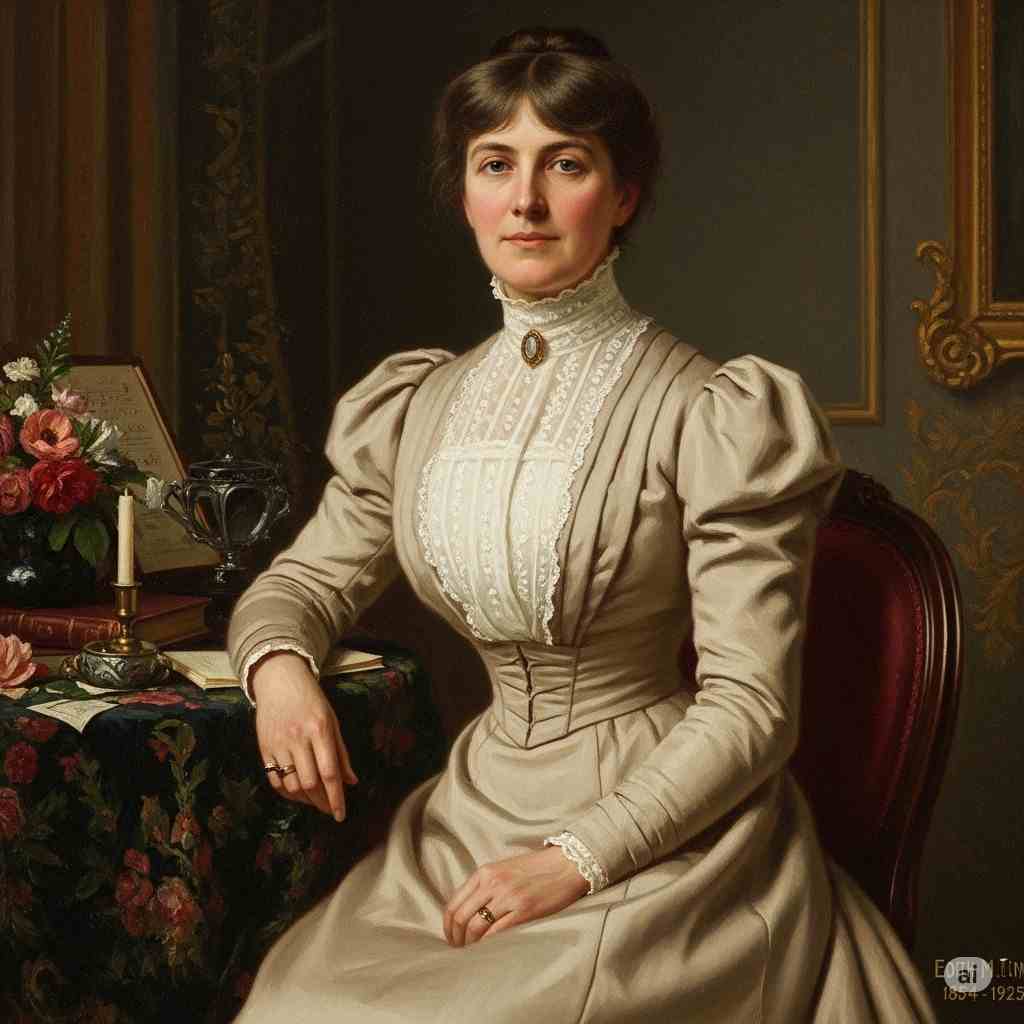1 Poems by Edith M. Thomas
1854 - 1925
Edith M. Thomas Biography
Edith Matilda Thomas, an American poet of the late 19th and early 20th centuries, emerged as a powerful voice in the burgeoning literary world that saw the rise of women poets breaking ground in the predominantly male domain of American letters. Known for her lyrical sensitivity, philosophical introspection, and connection to nature, Thomas captured the nuance and emotional complexity of human experience, rendering her work both timeless and distinctively rooted in her era. Her legacy, however, remains underappreciated outside scholarly circles, though her poetry resonated deeply with her contemporaries and laid important groundwork for later women poets.
Born in Chatham, Ohio, on August 12, 1854, Edith Thomas grew up in a society marked by dramatic social and cultural transitions. The rural setting of her childhood influenced her lifelong affection for nature, and her work often reflects the rustic beauty of Ohio landscapes with a blend of simplicity and elegance. Thomas’s early exposure to literature came from her mother, a well-read woman who introduced her to the works of classic English poets. Thomas showed a precocious talent for writing, creating poems and stories in her teenage years. Despite this early promise, she struggled with limited educational opportunities, though she would later attend Oberlin College briefly. Financial constraints and the conservative climate of the times prevented her from pursuing a full degree, yet she was able to self-educate through diligent reading and a tenacious curiosity.
The 1870s and 1880s in America were a fertile period for women writers, though many were restricted to sentimental or domestic themes. Thomas defied these conventions, drawing from her intimate observations of nature and human character. Her writing was also influenced by the era’s transcendentalist ideas, though she often infused them with a more personal, introspective approach. She began her career in journalism, contributing essays, short stories, and poetry to various periodicals. This breadth of exposure helped Thomas cultivate a distinct voice that balanced aestheticism with intellectual depth.
Thomas’s first major breakthrough came in 1885 when her poetry appeared in The Atlantic Monthly, a significant accomplishment given that publication’s reputation as a premier platform for literary talent. Her early poems were marked by a lyricism and emotional restraint that reflected her careful attention to form and language. Through her recurring themes—nature, love, mortality, and philosophical musings—she forged a unique style that attracted the attention of prominent literary figures, including the celebrated poet Helen Hunt Jackson. Jackson, known for her encouragement of emerging female writers, became an important mentor for Thomas, fostering her confidence and pushing her to pursue poetry more seriously. The support of Jackson, along with other established authors, opened the doors of prestigious literary circles to Thomas.
By the 1890s, Thomas had become well-known enough to publish several volumes of poetry, each met with critical acclaim. Her 1887 collection, A New Year’s Masque and Other Poems, established her as one of the era’s leading poets. This collection revealed her versatility, ranging from pastoral scenes to delicate meditations on the human spirit. Her descriptive language painted vivid images of rural America while hinting at universal themes of beauty and fragility. Thomas's keen sense of observation allowed her to evoke a particular sense of place and time, grounding her lyrical musings in tangible reality. Her nature poetry, reminiscent of Emily Dickinson yet distinctly her own, was full of reverence for the organic world, where even the smallest plant or bird became emblematic of broader spiritual truths.
A major thematic strand in Thomas’s poetry was her exploration of gender and identity. Although she was careful to avoid overtly feminist declarations, likely to maintain her professional standing within a conservative society, her poetry subtly subverted conventional expectations of women’s roles. In her sonnets and lyrics, there exists a quiet assertion of female intellectual independence and emotional complexity. She was, in many ways, a forerunner of feminist poetics, offering readers an alternative image of womanhood that was introspective, contemplative, and fiercely intelligent. Through her words, she carved a space for women in literature that was neither entirely domestic nor overtly radical but profoundly human.
Thomas’s later works showed an evolution in both style and subject matter. Her poetry, while retaining the lyricism and formal rigor of her earlier work, grew more reflective, addressing themes of memory, loss, and existential contemplation. Her 1904 collection, The Inverted Torch, delves into mortality and the ephemeral nature of life, expressing sentiments that resonated with readers who found comfort in her philosophical inquiry. Thomas’s use of classical references, combined with modern sensitivity, created a style that was simultaneously timeless and distinctly of her moment. Her poetic exploration of loss, often understated, conveyed a poignancy that would come to characterize much of her later work. This introspective shift mirrored the changing American literary landscape, which was moving toward realism and psychological depth.
Although her work was well-regarded by contemporaries, Thomas experienced personal difficulties, including battles with loneliness and isolation. Her later years were marked by a retreat from the social and literary scene, which in turn affected her output and visibility in the literary world. The arrival of modernist poets like T.S. Eliot, Ezra Pound, and Marianne Moore shifted critical attention away from the poets of Thomas’s generation, relegating her to a marginal position in American poetry. Nevertheless, her work continued to be appreciated by those who sought out her unique blend of lyricism and introspection.
Edith Thomas’s contributions to American literature extend beyond her poetry. She played a pivotal role in legitimizing the voice of women poets at a time when they were often excluded from literary recognition. Her influence can be seen in the work of subsequent generations of female poets who embraced her willingness to explore complex emotional and philosophical landscapes. Poets such as Edna St. Vincent Millay and Sara Teasdale, both of whom would gain fame in the 20th century, owed a stylistic debt to Thomas’s explorations of introspective lyricism and thematic courage. Her willingness to delve into existential themes laid the groundwork for later poets to approach traditionally masculine subjects with a distinctly feminine perspective.
Though Edith M. Thomas never achieved the lasting fame of some of her contemporaries, her body of work remains an essential part of American poetry’s evolution. Her verse captures a transitional period in American letters, balancing the romanticism of the 19th century with a more modern, introspective sensibility. Her poetry speaks to the timelessness of nature, the intricacies of the human heart, and the eternal quest for meaning, making her a poet whose work still resonates with those who seek beauty and truth through language. Today, scholars and poetry enthusiasts alike find in her work a quiet yet potent voice that speaks to the universal themes of love, loss, and the enduring beauty of the natural world.
Edith M. Thomas’s life and poetry embody the struggle for intellectual and creative independence that many women of her time faced. Her legacy, though somewhat obscured by the shifting tastes of literary history, endures through the delicate power of her verse, which continues to inspire those who encounter her work. In revisiting her poetry, readers can appreciate the understated strength and profound sensitivity that marked her contributions to American literature. Her voice, though often quiet and contemplative, asserts itself with a clarity that transcends the limitations of time, preserving her place in the landscape of American poetry.
This text was generated by AI and is for reference only. Learn more
Username Information
No username is open
Everything is free to use, but donations are always appreciated.
Quick Links
© 2024-2025 R.I.Chalmers (V2Melody).

All music on this site by R.I.Chalmers (V2Melody) is licensed under a Creative Commons Attribution-NonCommercial 4.0 International License.
Attribution Requirement:
When using this music, you must give appropriate credit by including the following statement (or equivalent) wherever the music is used or credited:
"Music by R.I.Chalmers (V2Melody) – https://v2melody.com"
Support My Work:
If you enjoy this music and would like to support future creations, your thanks are always welcome but never required.
Thanks!


